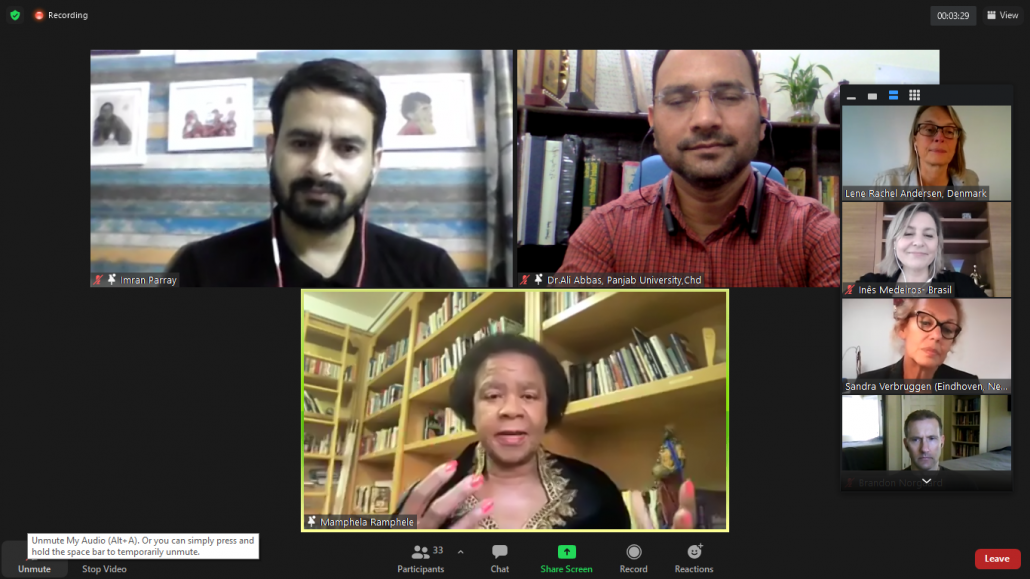Chandigarh September 22, 2021
Webinar on “AFGHANISTAN: THE TALIBAN TAKEOVER, REGIONAL POWERS AND IMPLICATIONS FOR INDIA” by Dr. Shalini Chawla at the Department of Defence and National Security Studies.
The Department of Defence and National Security Studies, Panjab University, Chandigarh organized a special webinar on the topic “AFGHANISTAN: THE TALIBAN TAKEOVER, REGIONAL POWERS AND IMPLICATIONS FOR INDIA” by Dr. Shalini Chawla, a distinguished fellow and heads Pakistan and Afghanistan studies at the Centre for Air Power Studies (CAPS), New Delhi. She was a research scholar at the Institute for Defence Studies and Analyses, 1999-2002. She worked as a free-lance defence analyst from 2003-2005 in Colombo, Sri Lanka. She joined CAPS in 2006 and focus of her studies is Pakistan and Afghanistan.
Through this lecture, Dr. Chawla mainly wanted to draw attention to the challenges that India is going to face due to the Afghan crisis. She said that the agreement reached between the United States and the Taliban organization has many flaws and there is no concept of peace in it. The withdrawal of US troops from Afghanistan has posed many challenges and opportunities for regional powers such as Pakistan, Iran, China, Russia, and India. Talking about the implications for India, she said that at present the situation in the case of India is very unfavorable and it may face many more challenges in the near future. New Delhi does not recognize the Taliban as a governing authority in Afghanistan. As a friendly neighbor, India has always been concerned about peace and security in and around Afghanistan. That is why the Government of India supports all peace initiatives and engages with many stakeholders, including regional countries.
She further said that India is historically linked to Afghanistan, and it is its gateway to Central Asia. It has always wanted to protect the Afghan territory from Pakistan so that they cannot use it for any anti-India activities. But after the Taliban occupation of Afghanistan, India is now concerned about its commitment to the Afghan people. She is also apprehensive about the China-Pakistan alliance in Afghanistan. It fears that the soil of Afghanistan may be used by Pakistan for its anti-India terrorist activities.
She further said that regional powers like Pakistan and China are supporting the Taliban government for their strategic interests. Pakistan has already said that they will support an independent, democratic and sovereign Afghanistan, which they mean by a Taliban government ruling the Afghan people. Dr. Chawla stressed that Pakistani leaders always think that the Taliban will help them in the acquisition of Kashmir from India. That’s why they are providing the Taliban with equipment training and money to the best of their ability. Another hidden aim of Pakistan is that it wants to form a pro-Pakistan government in Afghanistan, which will help them resolve the border issues with Afghanistan and it will prevent the Pashtuns from demanding a separate Pashtunistan. She further said that since Pakistan’s own economy is in trouble, it is difficult to say how long Pakistan will support the Taliban with money and equipment. She said Pakistan would face international repercussions for its actions in Afghanistan.
While explaining China’s position in Afghanistan, Dr. Shalini highlighted that China always acts according to its security and strategic interests. Diplomatically, China has said that it is always ready to develop friendly and cooperative relations with Afghanistan and play a constructive role in Afghanistan’s peace and reconstruction. But its main objectives are: defending its borders and controlling the spread of extremism in Xinjiang, exploration of minerals in Afghanistan, and controlling regional expansionism. Apart from these, China’s main multilateral approach is to build three main alliances: Afghanistan-China-Pakistan, Afghanistan-Pakistan-Iran-China, and third is China-Pakistan-Afghanistan-Nepal. Like India, China also sees Afghanistan as a route to Central Asia. Dr. Chawla also focused on Russian and Iranian interests in the Afghan region. She said that with the Taliban’s takeover of Afghanistan, Russia is also concerned about its border security and influence in the region. Keeping its security interests in mind, Russia hosted a peace conference between the Afghan government and the Taliban in March 2021. But later when the Taliban controlled Afghan territory, Russian leaders also became concerned about the security challenges they would face in Central Asia and the Afghan region. Talking about Iranian interest in Afghanistan, Dr. Shalini said that Iran is portraying diplomatically that it is very concerned for the peace and security of Afghanistan but in reality, it is more concerned about the security of Afghan Shias. Decades of conflict have driven hundreds of thousands of Afghan refugees into Iran. Iran expects peace and stability there from the Taliban regime in Afghanistan and is looking for friendly relations with Afghanistan. Concluding her lecture, Dr. Chawla said that everything looks very pessimistic right now. Every state is looking after Afghanistan and acting according to its interest. Presently, the situation for India is not in its favor and the Pakistan-Afghanistan alliance is a big challenge, but India is still committed to help the Afghan people.
The lecture was attended by members of various faculty members, serving and retired armed officers pursuing various courses in the department, research scholars and students. The lecture was followed by a question answer session with the audience.




